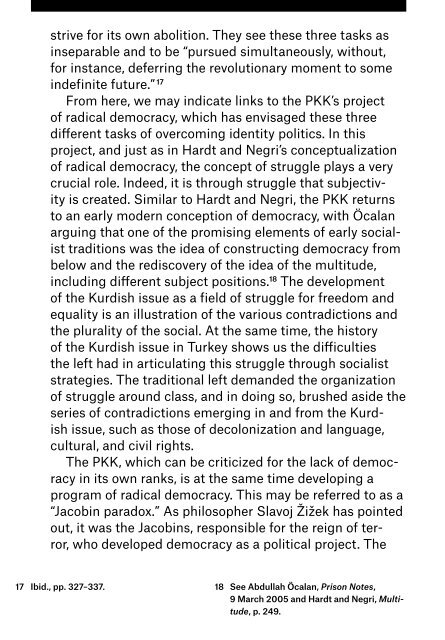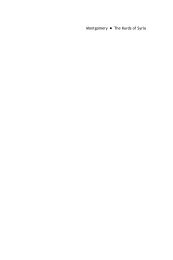Stateless Democracy
1RHiH4Y
1RHiH4Y
Create successful ePaper yourself
Turn your PDF publications into a flip-book with our unique Google optimized e-Paper software.
strive for its own abolition. They see these three tasks as<br />
inseparable and to be “pursued simultaneously, without,<br />
for instance, deferring the revolutionary moment to some<br />
indefinite future.” 17<br />
From here, we may indicate links to the PKK’s project<br />
of radical democracy, which has envisaged these three<br />
different tasks of overcoming identity politics. In this<br />
project, and just as in Hardt and Negri’s conceptualization<br />
of radical democracy, the concept of struggle plays a very<br />
crucial role. Indeed, it is through struggle that subjectivity<br />
is created. Similar to Hardt and Negri, the PKK returns<br />
to an early modern conception of democracy, with Öcalan<br />
arguing that one of the promising elements of early socialist<br />
traditions was the idea of constructing democracy from<br />
below and the rediscovery of the idea of the multitude,<br />
including different subject positions. 18 The development<br />
of the Kurdish issue as a field of struggle for freedom and<br />
equality is an illustration of the various contradictions and<br />
the plurality of the social. At the same time, the history<br />
of the Kurdish issue in Turkey shows us the difficulties<br />
the left had in articulating this struggle through socialist<br />
strategies. The traditional left demanded the organization<br />
of struggle around class, and in doing so, brushed aside the<br />
series of contradictions emerging in and from the Kurdish<br />
issue, such as those of decolonization and language,<br />
cultural, and civil rights.<br />
The PKK, which can be criticized for the lack of democracy<br />
in its own ranks, is at the same time developing a<br />
program of radical democracy. This may be referred to as a<br />
“Jacobin paradox.” As philosopher Slavoj Žižek has pointed<br />
out, it was the Jacobins, responsible for the reign of terror,<br />
who developed democracy as a political project. The<br />
17 Ibid., pp. 327–337. 18 See Abdullah Öcalan, Prison Notes,<br />
9 March 2005 and Hardt and Negri, Multitude,<br />
p. 249.<br />
PKK is Jacobinian in the sense that it simultaneously uses<br />
violence as an instrument for the realization of its political<br />
program of radical democracy.<br />
II. Radical <strong>Democracy</strong> in the Kurdish Context<br />
During the 2000s, the PKK elaborated a new ideological<br />
framework promoting this project of radical democracy.<br />
In doing this, the PKK made a kind of salto mortale by<br />
reinventing itself through a series of transformations and<br />
arguing that the nation be defined not on the basis of<br />
ethnicity or language but on the basis of citizenship in a<br />
democratic republic.<br />
The PKK’s ideological transformation towards a project<br />
of radical democracy was based on defense texts written<br />
by Öcalan and submitted to the different courts in which<br />
his case was heard. These defenses can be grouped into<br />
two categories: those submitted to the Turkish courts, and<br />
those submitted to the European Court of Human Rights<br />
(ECHR) in Strasbourg, along with one at a court in Athens<br />
(concerning his expulsion from Greece). The documents<br />
have been published in Kurdish and Turkish as well as in<br />
other languages. 19 These defense texts were accepted in<br />
19 The first group consists mainly of two<br />
defense texts: the main text, submitted to<br />
the court in Imrali and an annex, submitted<br />
to the Court of Appeals in Ankara in<br />
1999 and to a local court in Urfa in 2001.<br />
These first texts were published under the<br />
titles Declaration on the Solution of the<br />
Kurdish Question and Urfa: The Symbol<br />
of History, Divinity and Wretched[ness]<br />
in the Basin of the Tigris-Euphrates. The<br />
second group of defense texts, submitted<br />
to the ECHR in 2001, to an Athenian court<br />
in 2003, and to the Grand Chamber of the<br />
ECHR in 2004, consisted of two books<br />
that together comprised three volumes.<br />
The first book (of two volumes) was<br />
published as From Sumerian Clerical State<br />
Towards People’s Republic I-II (2001),<br />
while the second book (and third volume)<br />
was published as The Defense of Free Man<br />
(2003) — known in PKK circles as the “Athens<br />
Defence” — and Defending a People<br />
(2004). Lastly, Öcalan submitted another<br />
text of defense to the ECHR in Strasbourg<br />
concerning his case for the right to a fair<br />
trial. In 2009 and 2010, this defense text,<br />
which Öcalan defines as problematizing<br />
capitalist modernity, was published in<br />
Turkish in four volumes.<br />
168–169



